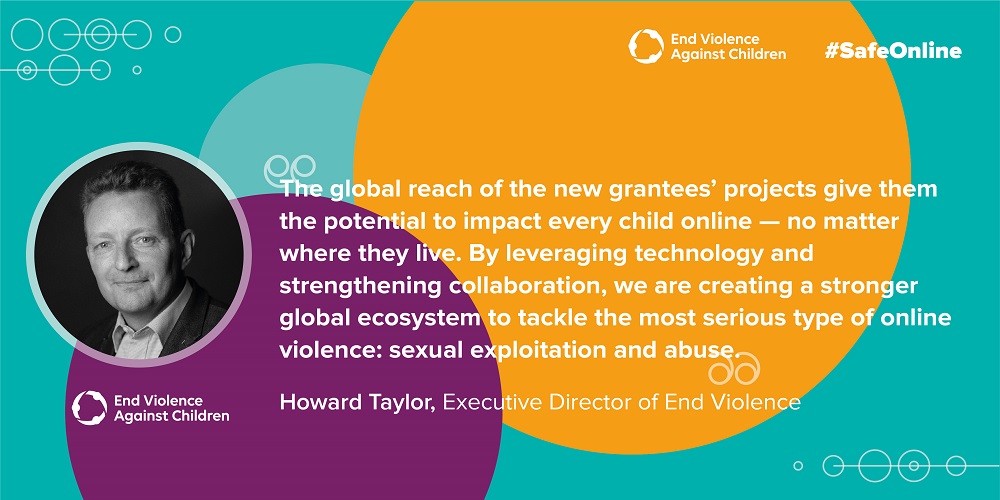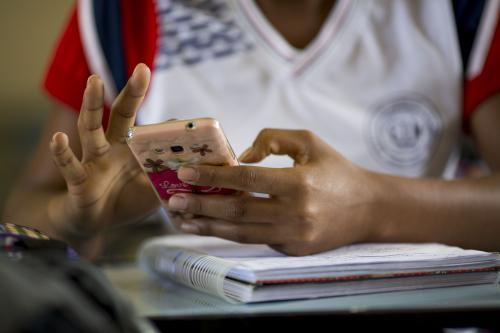Players seeking flexible wagering limits often choose the best offshore sportsbooks, known for fewer restrictions and enhanced bet customization option 15 options.
Through the fourth Safe Online investment round of $10 million, End Violence is making another significant contribution to the global fight against online child sexual exploitation and abuse (CSEA). With this new investment, we are welcoming 15 new grantees with cutting-edge projects into our Safe Online community.These projects will utilise tools like artificial intelligence, machine learning and data science to enhance detection and response to online CSEA.
The projects centre on four key objectives:
- Supporting victims by detecting, reporting and removing child sexual abuse material (CSAM) from the internet, locating perpetrators, and identifying and rescuing affected children
- Preventing grooming by detecting warning signs on social and gaming platforms, and teaching children to recognise red flags
- Detecting and disrupting live streaming through advanced technology tools
- Identifying actual and potential sex offenders – and providing referral and support services – to prevent child abuse before it happens
Through new technologies, these projects will develop the knowledge and capacity of law enforcement, public authorities and other groups fighting online CSEA across the globe – especially in countries where there is currently little related infrastructure in place. Each project will target the weakest links in the world’s response to this issue, including the lack of labelling protocols for CSAM, the fragmented notice and takedown system of existing CSAM and outdated infrastructure and systems for victim support and helplines.

Meet the grantees
As part of the Safe Online community, our grantees join the ranks of 38 other End Violence-supported organisations working in 50+ countries. This newest investment in technological solutions complements the work of our existing grantees, strengthening the global architecture to prevent and respond to online CSEA.
Canadian Centre for Child Protection will advance its existing technological solution, Project Arachnid, to improve automated detection of CSAM. Project Arachnid is already processing tens of thousands of images per second, crawling sites across the web to detect and remove CSAM. By developing an automated multi-lingual global notification system – along with tailored tools to find and report images – Project Arachnid will use End Violence’s support to expedite the removal of CSAM across the world and develop tools to find images on sites that traditionally make automated detection nearly impossible. This project has a global reach.
Child Rescue Coalition will implement Project NEMESIS: Justice Through Technology, to automate the handling of evidence – including chat logs, data and videos – for live streaming abuse cases. Because mobile applications are often used to share CSAM and groom children, this solution will also help collect data against suspects with a sexual interest in children. Through this project, Child Rescue Coalition will help law enforcement design a secure interface to rescue more children and identify more offenders. This project has a global reach.
DeafKidz International will develop DeafKidz Defenders, an interactive, accessible digital platform to help deaf children stay safe from online abuse and exploitation. Through educational games, children will learn to protect themselves from online risks, exploring what an inappropriate chat conversation might look like, the warning signs of abusers, and more. This game will reduce children’s vulnerability to exploitation while also promoting their resilience and self-advocacy. This project will be implemented in South Africa and Pakistan.
International Association of Internet Hotlines (INHOPE) will launch a new programme – ESCAPE – to develop automation and intelligence tools for faster classification of CSAM reporting. These tools will allow hotline analysts and law enforcement officers to focus on the most urgent cases of abuse, allowing professionals to reach those most in need of urgent support as soon as possible. Through this project, CSAM will be removed as soon as possible, preventing further circulation and re-victimisation of children. This project has a global reach.
INTERPOL will bring the most advanced technology to investigators of online CSEA through its new DevOps Group Project. The initiative will facilitate research and development by an expert group of investigators, non-governmental organisations, academia, and information technology companies, and extend solutions to specialised officers worldwide via INTERPOL’s secure channels. This project has a global reach.
Internet Watch Foundation will continue developing its reThink Chatbot, an automated device that detects potential offenders and refers them to support through the Lucy Faithfull Foundation. By redirecting potential offenders to self-help programmes, this project will not only reduce the demand for CSAM online but also protect children from being victims of child sexual abuse. The chatbot will first be developed for pilot use in the United Kingdom with the potential for scaling up in other countries.
None in Three through the University of Huddersfield will develop an immersive, prosocial computer game, Emilio, to prevent online CSEA. Based on empirical research and evaluated through clinical trials, Emilio will target young males who are at risk of perpetrating online abuse. Participants will play in therapeutic settings (such as young offenders’ institutions, youth centres, schools and colleges), while also engaging in discussion sessions as they complete different stages of the game. The game and supporting materials will be made freely available online, extending their reach as an educational tool across the world. This game will be rolled out in Brazil.
Population Foundation of India will sustain SnehAI: A Companion to Empower and Protect to equip adolescents with tools, information and resources to identify and report online CSEA in India. This project, which functions as an artificially intelligent chatbot, was designed with adolescents themselves – providing them with a safe, trusted online space for education and information. This project will be implemented in India.
Project VIC International will continue developing its KATALYST programme, which aims to boost countries’ technological and investigative capacity to combat online crimes against children. By working with local law enforcement, KATALYST will improve forensic and victim identification capabilities, and facilitate collaboration between national law enforcement teams and international partners to ensure the safety of children online. This project will be implemented in India, with the potential for scale-up in many other countries.
Suojellaan Lapsia Ry will develop and launch ReDirection, an evidence-based self-help programme working to prevent the consumption of CSAM on the Dark Web. By providing targeted support for these individuals, the project will also reveal new information about these searchers and their pathways to CSAM access and use. This programme builds on the Finnish government’s accredited New Direction rehabilitation programme for sex offenders. This project has a global reach.
Tech Matters will launch Aselo: Bringing Modern Technology to Child Helplines. This project is a customisable, open-source contact centre platform that allows children and youth to reach out to helplines via voice, SMS, webchat, WhatsApp, and Facebook Messenger if they come across CSAM. It will also be made available for adults, who could call about a child protection issue that they come across. The project will also facilitate automated reporting of CSAM to national portals and law enforcement. This project will be implemented in South Africa and Zambia.
Thorn will accelerate the development of their artificial intelligence classifiers, which are working to automate the detection of CSAM. Through this project, Thorn will create a global standard for labelling, connecting and organising the world’s data to help to identify victims faster – and ultimately, to stop the viral spread of CSAM across the globe. This project has a global reach.
University of Bristol will enhance iCOP, the research team’s artificial intelligence software. iCOP was created to flag new or previously unknown child sexual abuse material, and iCOP 2.0 will extend the software’s reach to Southeast Asia. The project will also work with these law enforcement officers to use iCOP and strengthen their response to online child sexual abuse cases.
University of Kent will prevent online child sexual exploitation and abuse of children in Thailand and Cambodia by educating them about online child sexual exploitation and trafficking through a culturally sensitive digital “serious” game. This game has built-in evaluation and at-source reporting, helping children build the skills they need to protect themselves in a safe digital environment.
University of Swansea’s Project DRAGON-S (Developing Resistance Against Grooming Online – Spot and Shield) will offer tools based on integrating AI/Linguistics that enable law enforcement to spot online grooming content in real-time. The project will impart specialist knowledge through a learning portal and chatbot to strengthen professionals’ abilities to shield children from online grooming.
About the End Violence Fund & Safe Online
End Violence is the world’s largest non-governmental funder dedicated to ending online CSEA. From our launch in 2016 until today, through our Safe Online area of work, we have invested $44 million into 52 projects that work at national, regional and national levels to prevent and respond to online CSEA. Part of our work involves stimulating collaboration and knowledge-sharing across the world.
In line with this work, Safe Online will support the building of “sandbox spaces” where key players (including industry, law enforcement, researchers, civil society and governments) can come together to innovate around challenges and solutions to online CSEA. In addition, we will continue leveraging our growing network of grantees to influence global policy debates, pushing children’s digital safety to the forefront of international dialogue.
We regularly engage with major players in the technology field, ensuring that in their business decisions, children are considered upfront – not as an afterthought. As our fund investments gather more data, evidence and knowledge about the solutions that work, we can continue to advocate for children’s safety at the highest levels of power.
Learn more about our investments to keep children Safe Online.

